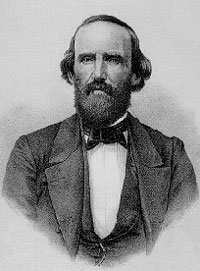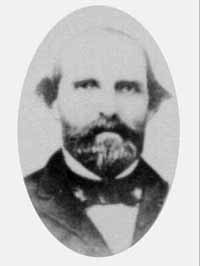|
Benjamin McCulloch
Benjamin McCulloch was born in Rutherford County, Tennessee, on November 11, 1811. His family moved a lot, living at various times in North Carolina, Alabama, and Tennessee.
In 1835, Benjamin moved to Texas, enlisted in the Army of Texas, and participated in the Battle of San Jacinto. Falling ill, he returned to Tennessee after only three months. He returned to Texas the following year with a company of thirty men under the command of Captain Robert Crocke tt, the son of Davy Crockett, a neighbor. tt, the son of Davy Crockett, a neighbor.
He returned again to Tennessee in 1837 and learned surveying, remaining until 1838, when he moved to the Guadalupe and San Marcos valleys of Texas, securing a position as a surveyor, but also serving as a Texas Ranger.
Later that year, he was joined by his younger brother, Henry, and the two settled in what is now Seguin, in Guadalupe County, the two brothers earning reputations as Indian fighters.
In 1839, he was elected to a seat in the House of the 4th Congress of the Republic of Texas. He was severaly wounded in a duel with a Colonel Ruben Ross, stemming from the heated election. Colonel Ross helped to bandage his wounds, and the two became friends.
In 1845, he was elected to the House of Representatives of the 1st State Legislature, and the following year he was promoted to Major General of the Militia of Texas, and put in command of the militia west of the Colorado River.
During the Mexican War, however, he entered the regular army as a Captain of a Company attached the Colonel John Hayes’ regiment, serving under the command of General Zachary Taylor.
In 1849, along with a few friends, McCulloch traveled to the Sacramento area of California. He was elected Sheriff of San Francisco County on the same day that Colonel John Hayes was elected Sheriff of the City of San Francisco.
 In 1852, he returned to Texas and, the following year, was appointed United States Marshall of the eastern district of Texas, an office he held for eight years despite the fact that he spent most of his time in Washington, studying military tactics. In 1852, he returned to Texas and, the following year, was appointed United States Marshall of the eastern district of Texas, an office he held for eight years despite the fact that he spent most of his time in Washington, studying military tactics.
In 1858, he was appointed Commissioner to Utah, helping to prevent the Mormon troubles from escalating into a civil war.
At the outbreak of the American Civil War, he offered his services to the Confederacy, and was commissioned as a Brig. General in May of 1861.
Commanding the Confederate right wing at the Battle of Pea Ridge on March 7, 1862, McCulloch’s forces overran and drove the Union troops from their position. General McCulloch, however, was shot and killed, and the Confederate gains were shortlived.
|

